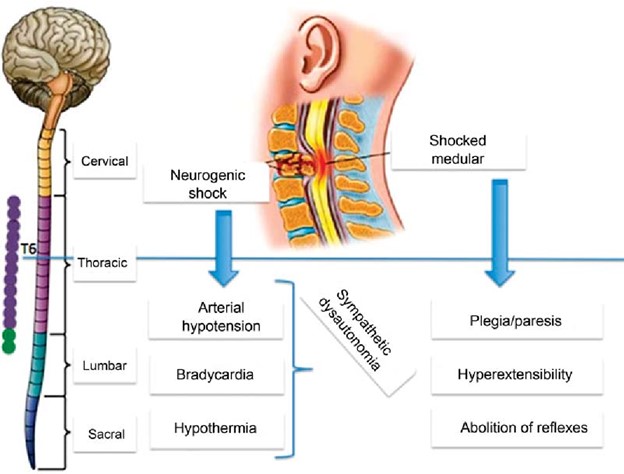A client arrives to the emergency department after falling from a ladder. The client has a loss of sensation and flaccid paralysis. Which of the following complications of an acute spinal cord injury does the nurse suspect?
Hemorrhage
Spinal shock
Apoptosis
Neurogenic shock
The Correct Answer is B
Choice A Reason: Hemorrhage is not a complication of an acute spinal cord injury, but rather a possible cause of it. Hemorrhage can occur due to trauma or rupture of blood vessels in or around the spinal cord, leading to compression and damage of the nerve tissue.
Choice B Reason: This is the correct choice. Spinal shock is a complication of an acute spinal cord injury that occurs within minutes to hours after the injury. It is characterized by loss of sensation, motor function, reflexes, and autonomic function below the level of injury. It is caused by transient disruption of nerve conduction and synaptic transmission in the spinal cord.
Choice C Reason: Apoptosis is not a complication of an acute spinal cord injury, but rather a cellular process that occurs after it. Apoptosis is programmed cell death that occurs in response to injury or stress. It can lead to further loss of neurons and glial cells in the spinal cord over time.
Choice D Reason: Neurogenic shock is a complication of an acute spinal cord injury that occurs within hours to days after the injury. It is characterized by hypotension, bradycardia, and peripheral vasodilation due to loss of sympathetic tone and unopposed parasympathetic activity. It is caused by disruption of autonomic pathways in the spinal cord.

Nursing Test Bank
Naxlex Comprehensive Predictor Exams
Related Questions
Correct Answer is A
Explanation
Choice A reason: This is the correct answer because bacterial meningitis is a medical emergency that requires immediate antibiotic therapy to prevent complications and death.
Choice B reason: This is incorrect because documenting intake and output is not a priority action for a child with bacterial meningitis. Fluid balance is important, but not as urgent as antibiotic administration.
Choice C reason: This is incorrect because reducing environmental stimuli is a supportive measure that can help reduce headache and photophobia, but it is not a priority action for a child with bacterial meningitis. The nurse should focus on preventing infection spread and monitoring for signs of increased intracranial pressure.
Choice D reason: This is incorrect because maintaining seizure precautions is a preventive measure that can help protect the child from injury, but it is not a priority action for a child with bacterial meningitis. The nurse should administer anticonvulsants as prescribed and observe for seizure activity, but the main goal is to treat the infection.
Correct Answer is B
Explanation
Choice A reason: This is incorrect because a drop in heart rate from 74 to 68/min is not a manifestation that requires immediate reporting to the provider. A mild decrease in heart rate can be normal or due to other factors such as medication, sleep, or relaxation. It does not indicate a worsening of brain injury or increased intracranial pressure.
Choice B reason: This is the correct answer because a change in the Glasgow Coma Scale score from 14 to 10 is a manifestation that requires immediate reporting to the provider. The Glasgow Coma Scale is a tool that measures the level of consciousness based on eye-opening, verbal response, and motor responses. A score of 14 indicates mild impairment, while a score of 10 indicates moderate impairment. A decrease in score can indicate deterioration of neurological status and increased intracranial pressure, which can be life-threatening.
Choice C reason: This is incorrect because the headache is not a manifestation that requires immediate reporting to
the provider. Headache is a common symptom of mild TBI and can be managed with analgesics, rest, and hydration. It does not indicate a worsening of brain injury or increased intracranial pressure unless it is severe, persistent, or accompanied by other signs such as vomiting, confusion, or seizures.
Choice D reason: This is incorrect because diplopia is not a manifestation that requires immediate reporting to
the provider. Diplopia means double vision and can be caused by damage to cranial nerves or eye muscles due to TBI. It can be treated with eye patches, glasses, or surgery. It does not indicate a worsening of brain injury or increased intracranial pressure unless it is associated with other symptoms such as blurred vision, loss of vision, or eye pain.
Whether you are a student looking to ace your exams or a practicing nurse seeking to enhance your expertise , our nursing education contents will empower you with the confidence and competence to make a difference in the lives of patients and become a respected leader in the healthcare field.
Visit Naxlex, invest in your future and unlock endless possibilities with our unparalleled nursing education contents today
Report Wrong Answer on the Current Question
Do you disagree with the answer? If yes, what is your expected answer? Explain.
Kindly be descriptive with the issue you are facing.
